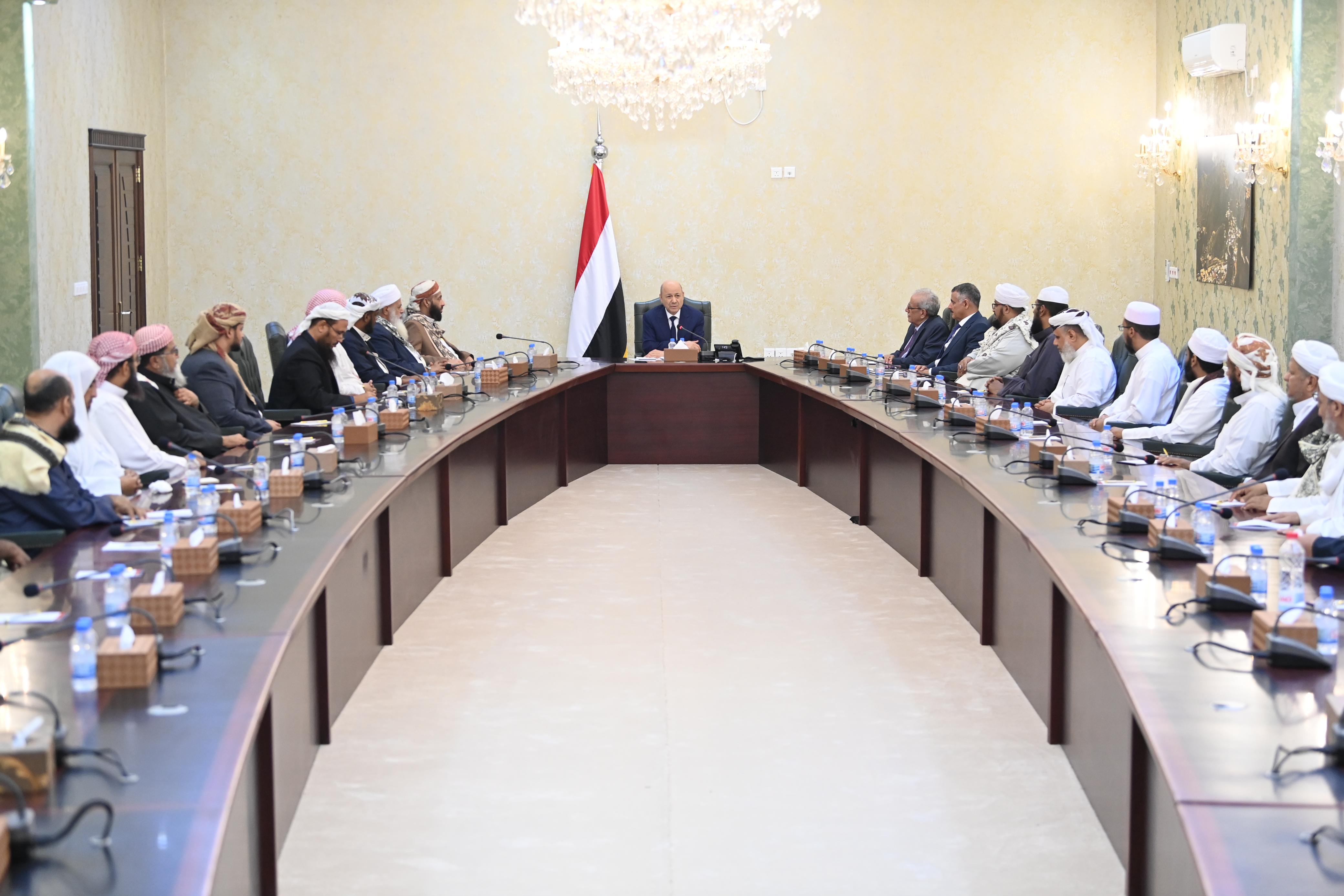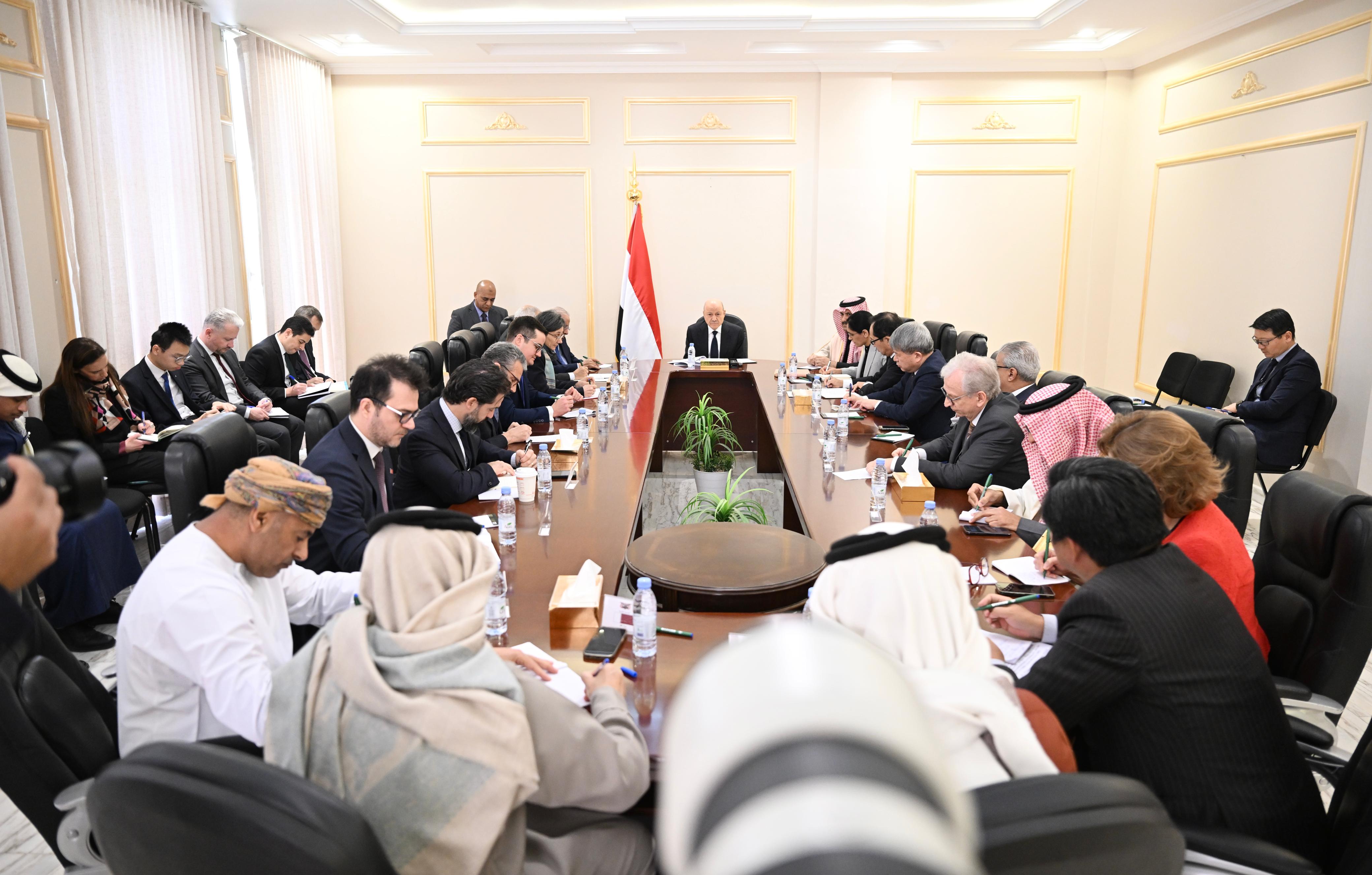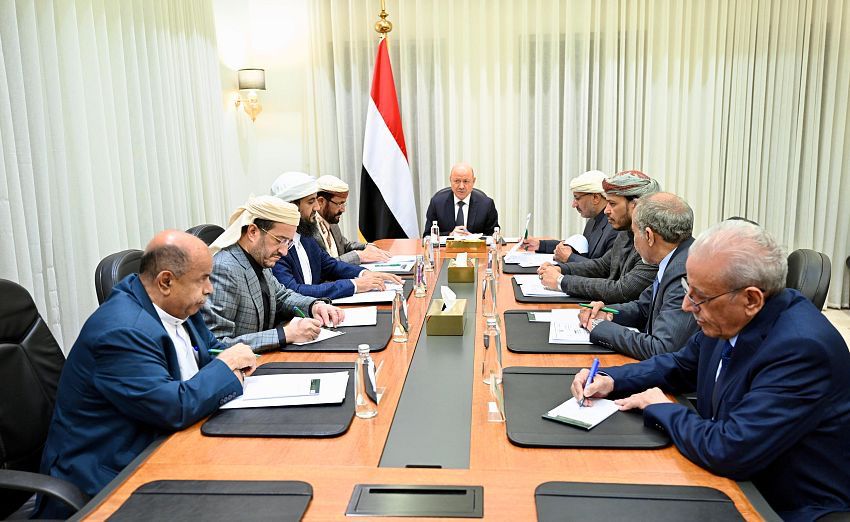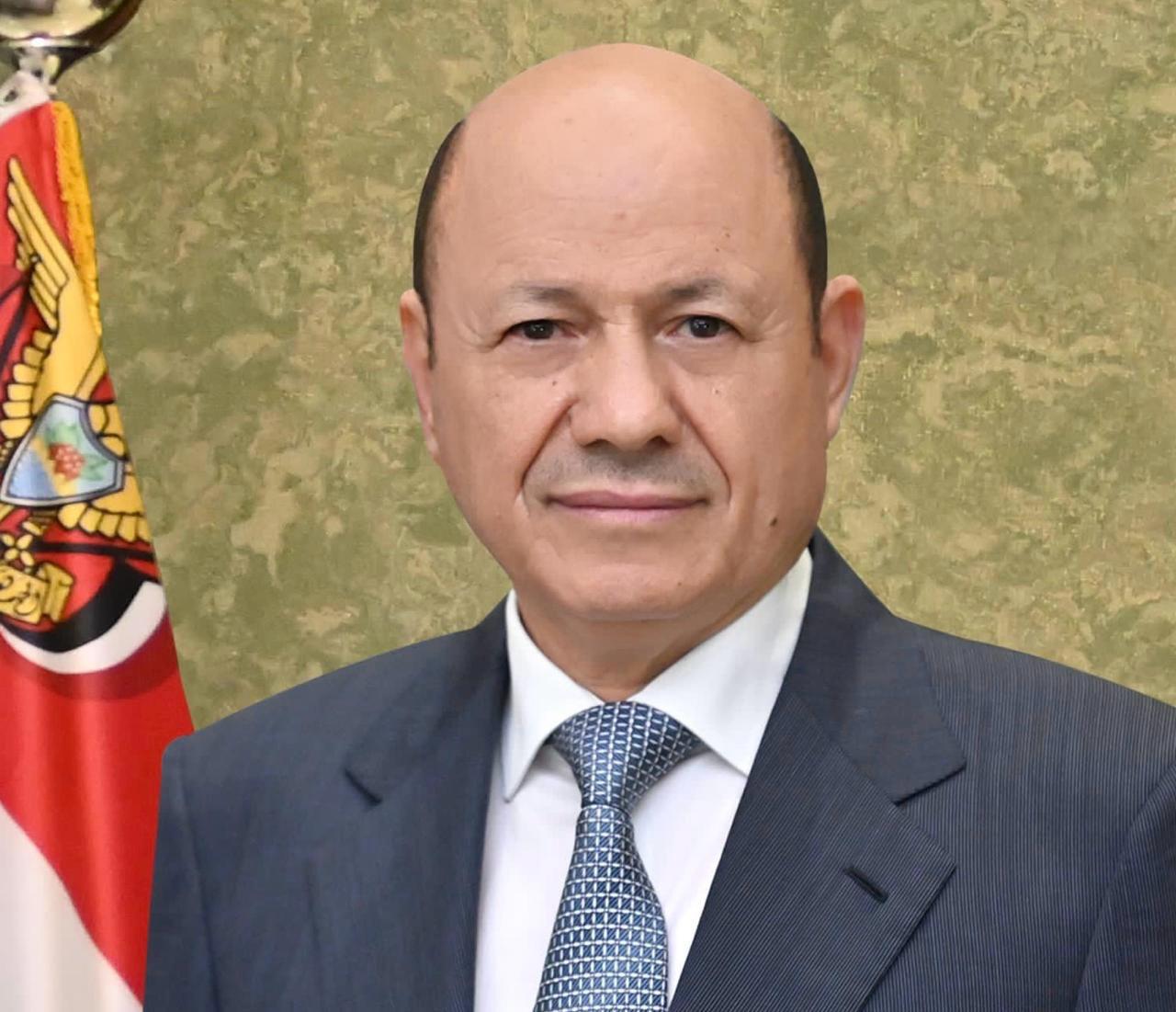
President Al-Alimi urges religious scholars and guides for an innovative religious discourse
Aden
His Excellency President Dr. Rashad Mohammed Al-Alimi, President of the Presidential Leadership Council, has met with virtuous religious scholars, preachers, and religious guides, in the presence of Sheikh Mohammed Ayadah Shabiba, the Minister of Guidance and Endowments.
At the beginning of the meeting, the President of the Presidential Leadership Council welcomed the attendees at the Ramadan evening. His Excellency prayed to Allah Almighty to restore the holy month and its blessed days with aspirations of goodness, peace, dignity and glory for our nation and Yemeni people.
The President of the Presidential Leadership Council, on his own behalf and the Council members, expressed great respect and appreciation for religious scholars, preachers, and da'is, and their role in strengthening the nation, promoting social peace. In addition, the president praised religious scholars, preachers, and da'is’ role in mobilizing and directing energies towards serving citizens’ public Interest. He addressed their central issues, including restoring state institutions, ending the Houthi militia’s coup, combating terrorism in its various forms and sources, catalyzing development efforts and improving services.
His Excellency addressed the religious scholars and preachers, saying that the meeting is not for the purpose of exchanging pleasantries, but rather for an open and responsible discussion about Yemeni people’s challenges and the role of religious leaders in facing them, as they are the moral and intellectual reserves of the nation.
He added, "We believe that the role of religious scholars and preachers is greater than just preaching and guiding, we look at you as thinkers, innovators, and social reformers at the same time."
The President addressed the importance of distinguishing between behavioral religiosity and religious discourse, saying, "Behavioral religiosity is related to the relationship between the servant and his Lord, while religious discourse is related to permissible interests and Sharia-compliant objectives, consequently it is not a personal matter but a public matter."
The President of the Presidential Leadership Council spoke about the uniqueness of Yemen as one of the most important centers of Islamic religious knowledge and thought for centuries. He added, in Yemen there are numerous intellectual and jurisprudential schools from which we should learn and draw heritage that is based on pluralism, diversity, and innovation .
His Excellency the president pointed out that the challenge facing religious thought nowadays lies in how to emulate the righteous predecessors without falling into stagnation, and how to respond to societal changes without succumbing to laxity. He explained that this equation can only be achieved by going back to the heritage of the righteous pioneers of Islamic theology, drawing from their methodologies without limiting ourselves to their specific issues.
He added, "It is important that we try to reform society and preserve its intrinsic values, but without letting that stands an obstacle to change and development."
President Al-Alimi stressed that Yemeni religious discourse today needs to focus on several aspects, foremost among them is ethics and good dealings, as they are the core of religion. The president also stressed that, it is important to take into account the requirements of times and the needs of the new generation, such as time investment, innovation, work productivity, and development as part of ethics and religious values.
He also stressed the importance of focusing on issues related to family cohesiveness, given the recent increased cases of domestic violence.
The President of the Presidential Leadership Council highlighted government's efforts in combating corruption and implementing administrative and financial reforms. He also highlighted the responsible role of religious discourse in supporting such efforts and linking the values of integrity and transparency to Islamic ethics.
He said: "It is unacceptable for anyone to come to perform religious rituals while receiving bribes, or stealing electricity.”
His Excellency urged the scholars, preachers, guides, and da'is’ to maintain the ethics and methodology of the righteous predecessors when addressing new issues and challenges, unlike the Houthi terrorist militias’s attempts to drag people into battles of the early centuries of Hijra.
The President stressed that religious discourse in this stage should focus on promoting the values of coexistence and social peace. Furthermore, he noted that the concept of "wali al-amr" (the guardian) no longer refers to the President as an individual, but also includes institutions.
His Excellency considered that respecting the law, state institutions, judicial authority, and security is an essential part of the Islamic values.
He continued, "When people respect institutions and recourse to them, national peace will be in a better situation ."
He urged to reject division, whether it is based on sectarian, tribal, or regional grounds, and to abandon all forms of dark ages prejudices, as described by the the prophet and Messenger (peace and blessings be upon him).
President Al-Alimi warned of the danger of bringing controversial political topics into Allah’s worshipping houses and places of worship. On the other hand, he stressed people's right to express their opinions, criticize, and object, as long as it is done with respect for the Islamic values, state institutions, and without promoting divisions.
The President of the Presidential Leadership Council stressed the need to focus on political, social and economic dimensions of justice in religious discourse.
His Excellency stated that criticizing terrorist militias should proceed from the concepts of justice and citizenship, not only because they harm the righteous companions of Prophet Mohammed (PBUH) but also because they adopt an approach and path that seek to impose false beliefs and an unjust, oppressive, and racist model of governance on people.
The president warned of the danger posed by extremist trends and terrorist violent groups who all share a refusal to embrace renewal, distort religious terminology, and adopt a hostile stance towards those who disagree with them. Additionally, those extremist groups violate religious principles through committing crimes such as assaulting lives, properties, and indecent assaults. Foremost among these groups are Houthi terrorist militias.
His Excellency the President also drew attention to the scourge of “takfir” ( declare someone a disbeliever) that has afflicted Muslim communities by passing judgments on people's consciences and intentions, which are matters that only Allah, the Almighty , has authority to determine.
He also pointed out that the state alone is entrusted with the decision of war or jihad. It is the competent authority in the country, in accordance with constitution and the law, and not groups or individuals.
The president also stressed the importance of supporting State’s efforts in combating drug, arms trafficking and taking all necessary educational, cultural, religious, and security measures to prevent this type of destructive contraband. His Excellency called for deterrent penalties on smugglers and those involved in its promotion.
President Al-Alimi called upon the imams and preachers to persuade the community to reject blood crimes, as they are a disgraceful Pre-Islamic legacy. His Excellency stressed the importance to refer the punishment of the murderer in such cases to the judicial authorities.
He also urged for redoubling awareness-raising efforts of the risks of being dragged behind rumors and this has serious implications for security and development of communities. In addition the president called for criminalizing antiquities trafficking or smuggling, as they are cultural heritage that belong to successive generations.
The President also affirmed women’s right to travel and hold senior positions in the state, in accordance with the constitution, laws in force, and the references of the current phase .
Moreover, the President of the Presidential Leadership Council reaffirmed Yemen's firm position in support of the Palestinian people and their right to self-defense and to their own an independent and fully sovereign state. The president highlighted the diplomatic efforts in which the Yemeni Republic, as part of the Arab and Islamic group, contributed to reaching an international decision for an immediate ceasefire and an end to the atrocity crimes against the Palestinian people.
During the meeting, the Minister of Guidance and Endowments along with the ministry leaders, religious scholars, preachers, da'is and guides, made interventions in which they praised the religious discourse's directives outlined in the speech of the President of the Presidential Leadership Council.
The interventions focused on the role of religious scholars, preachers, and da'is in promoting unity, moderation approach and rejecting division. In addition the interventions stressed the importance of keeping religious discourse away from any political disagreements or disputes.
The virtuous religious scholars also discussed the requirements for developing religious discourse and its Islamic preaching. In addition, the virtuous religious scholars touched upon the requirements for activating religious discourse role in supporting law enforcement authorities, and combating extremism.
The meeting was attended by Dr. Yahya Al-Shuaibi, the Director of the Office of the Presidency of the Republic.

President Al-Alimi: Developments on Ground Are Promising and Refute Claims of a Vacuum and Worst-Case Scenarios
His Excellency President Dr. Rashad Mohammed Al-Alimi, President of the Presidential Leadership Council, said that state institutions are making tangible progress in unifying security and military decision-making


